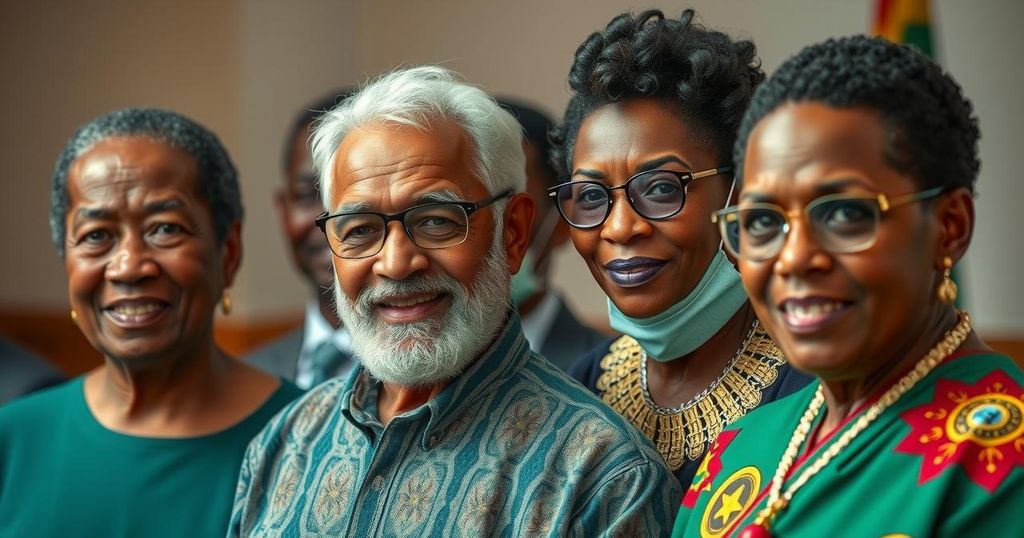Archbishop Samuel Kleda of Douala has urged aging political leaders in Cameroon to resign, emphasizing the need for new leadership. He criticized bad governance, corruption, and poor infrastructure, which have led to widespread poverty. With Cameroon facing an upcoming presidential election, Kleda calls upon citizens to engage in the electoral process to facilitate positive change.
Archbishop Samuel Kleda of Douala has issued a compelling call for the aging political leaders in Cameroon to step aside and allow a new generation to assume leadership roles. In an interview with RTVC, he expressed his concerns regarding rampant issues of poor governance, electoral misconduct, and corruption, which have all contributed to the prevailing poverty experienced by many Cameroonians despite the country’s abundant natural resources. Kleda emphasized that aging leaders may lack the requisite physical and intellectual vigor necessary for effective governance, stating that, “When we get to a certain age, we no longer have certain abilities, whether it is intellectual or physical,” a sentiment that resonates significantly given the current political landscape, particularly in reference to President Paul Biya, who has been in power for 42 years and will turn 92 in February.
The archbishop criticized the prevailing leadership’s inability to inspire developmental strategies that could uplift the nation and alleviate poverty, stating that the lack of solutions has fueled an exodus of youth in search of better opportunities abroad. He highlighted Cameroon’s wealth in natural resources and fertile land, asserting, “We have everything in Cameroon,” yet lamented that bad governance deteriorates the economic fabric and infrastructure of the nation.
Kleda pointed to the dire state of the country’s road infrastructure as emblematic of the failures of the current administration, wherein individuals, including farmers, must contend with exorbitant transportation costs due to the dilapidated conditions of roads. His remarks underscore the widening socio-economic inequalities; he noted, “We have reached the level where the country has been divided into two classes: those who are rich and those who are poor.” As the nation approaches the impending presidential elections, he urged citizens to register and vote, emphasizing the potential for change that each vote can represent.
As Archbishop Kleda called for accountability and an intergenerational shift in leadership, he challenged the notion of incumbents clinging to power amidst evident incapacity, reiterating that leaders should prioritize the welfare of the populace over personal ambition. His appeal illuminates the urgent need for transformative leadership that can effectively manage the country’s resources and promote equitable development. Through registered votes, he advocates for a collective movement towards positive change, encouraging the youth to engage with the political process actively.
The article discusses Archbishop Samuel Kleda’s appeal to aging leaders in Cameroon to resign and pave the way for new leadership. In light of President Paul Biya’s longstanding presidency, which will reach 42 years, the archbishop’s comments resonate with growing concerns about the effectiveness and health of Cameroon’s ruling elite. His perspectives shed light on broader issues of governance in Cameroon, including corruption, infrastructure deficits, and socioeconomic disparities. This context is crucial as Cameroon approaches its next presidential election, emphasizing the need for capable leadership that can meet the aspirations of its people, particularly the youth.
In summary, Archbishop Samuel Kleda’s calls for aging Cameroonian leaders to resign underscore critical issues of governance, leadership capacity, and socio-economic inequality within the country. His remarks stress the urgent need for a new generation to assume leadership roles and the importance of democratic engagement through voting. As Cameroon approaches presidential elections, the voices advocating for change reflect a broader desire among the populace for effective governance and development that aligns with their needs and aspirations.
Original Source: cruxnow.com






